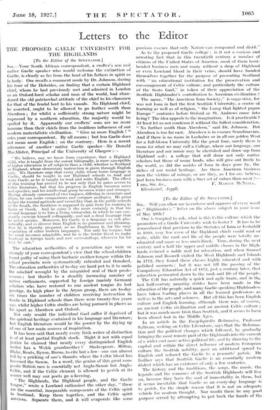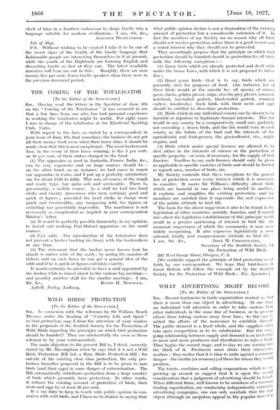[To the Editor of the SPECTATOR.]
SIR, --Will you allow me to endorse and approve of every word in " Highlander's " letter on the above subject in your issue of May 28th?
One is tempted to ask, what is this Celtic culture which the promoters of a Gaelic University wish to foster ? It has to be remembered that previous to the Statutes of Iona or Icohnkill in 1609, very few even of the Highland chiefs could read or write, while the rank and file of the people were totally cm- educated and more or less uncivilized. True, during the next century and a half the upper and middle classes in the High- lands evinced a noble zeal for education, and when Samuel Johnson and Boswell visited the West highlands and Islands in 1772, they found these classes highly educated and with polished manners ; but it was not till the passing of the Compulsory Education Act of 1872, just a century later, that education permeated down to the rank and file of the people.
The Celt has naturally a quick and agile brain, and in the last half-century amazing strides have been made in the education of the people, and many Gaelic-speaking Ilighlanders have taken leading places in all the learned professions as well as in the arts and sciences. But all this has been English culture and English learning, although there was, of course, an ancient Celtic civilization and an ancient Celtic culture ; but it was much more Irish than Scottish, and it seems to have been almost lost in the Middle Ages.
In an article in the Eneyelop(edia Britannica, Professor Sullivan, writing on Celtic Literature, says that the Reforma- tion and the political changes which followed, by gradually bringing the most remote part of the I lighlands into the current of a wider and more active political life, and by drawing to the capital and within the direct influence of modern European culture the Scottish nobility, gave an additional spread to English and reduced the Gaelic to a peasants' patois. He further says that Scottish Gaelic is an essentially modern dialect which has an existence of only a few centuries.
The history and the traditions, the songs, the music, the legends and the romance of the Scottish Highlands will live on, because they have the soul of immortality in them, but it seems inevitable that Gaelic as an every-day language is to perish, for the simple reason that it is not an adequate vehicle for modern thought. Nor would there be any good purpose served by attempting to put back the hands of the clock of time in a fruitless endeavour to shape Gaelic into. a language suitable for modern civilization.—I am, Sir, &c:,
ANOTHER HIG il LANDER.
Isle of Skye.
P.S.—Without wishing to be cynical I take it to be one of the worst signs of the health of the Gaelic language that fashionable people are interesting themselves in it at present, while the youth of the Highlands are learning English and discarding Gaelic as fast as they can. The latest available statistics will bear me out in this. Roughly, there are now twenty-five per cent. fewer Gaelic speakers than there were in the previous decennial period.



























































 Previous page
Previous page